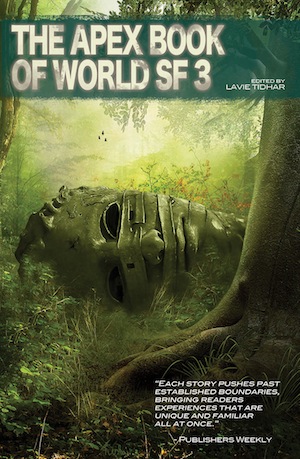Welcome back to the Short Fiction Spotlight, a space for conversation about recent and not-so-recent short stories. Last week we discussed stories by N. K. Jemisin and Yoon Ha Lee from the most recent issues of Clarkesworld, but in this installment, I thought it might be high time to check out an anthology again. It’s been awhile. So, for the next two Short Fiction Spotlights—since it’s a whole book and all—I want to talk about The Apex Book of World SF 3, edited by Lavie Tidhar.
This is the third in a series of anthologies collecting international speculative fiction, both in translation and published originally in English. For the sake of convenience, I figured I’d divide the reading and discussion into halves—one for each week of coverage. So, this week, I’d like to talk about two stories from the first half of the anthology that stood out to me: “Act of Faith” by Fadzlishah Johanabas and “The City of Silence” by Ma Boyong.
I’ve also written about one of the other stories in the first half before, Xia Jia’s “A Hundred Ghosts Parade Tonight,” when it appeared in The Year’s Best Science Fiction and Fantasy 2013 edited by Rich Horton. But for this installment, let’s get back to the two I found most interesting out of the first bunch—though it was admittedly a hard choice to make, since these stories are all pretty strong and compelling.
First, there’s Johanabas’s “Act of Faith.” This is a fairly classic “android learns to feel” sort of piece with an interesting twist in terms of faith and family. What stood out to me most about the piece were the simple-yet-complex dynamics of a family split up across great spaces, and the ways that people will make family for themselves. The father and son here are a compelling pair; so, too, is the android Sallehuddin an interesting addition to each of their lives.
The question of whether or not an android can have a soul—a soul that could be Muslim—is the thought-experiment of the piece, one I’ve seen before in different takes, but the real heft of the story is the significance of faith to the development of the android’s sense of individual identity. The rhythm of words and the pattern of learning the Quran together with Ahmad are what offer Sallehuddin a sense of belonging and the ability to stretch past his initial programming to develop strong feelings for his adoptive family.
This is a pretty understated story, honestly, that doesn’t overplay its hand much. It’s soft and contemplative and familial—so, while I’m normally not one for stories that deal with questions of religion, I actually quite liked this one for its exploration of how faith intersects with self and community.
In a different vein—though also working with familiar tropes in fresh ways—we have “The City of Silence” by Ma Boyong, translated by Ken Liu. This story is a dystopic tale about the slow erosion of language as a totalitarian state bans more and more words from use and offers only an increasingly small list of “healthy” words. The protagonist then finds a group of likeminded stifled people to talk freely for a day each week or two—though in the end the group is caught out.
This story deals well with human creativity and responsiveness—as well as the bleak possibilities of technology misused and the crushing weight of silence. It feels quite a bit, at first, like a 1984-style world; this is keyed up quite well later on, as the protagonist encounters the Talking Club who are hearing the book recited by a member who once read it. I appreciated the parallels the writer constructs, here, with both classic dystopian literature and the contemporary cultural environment of a repressive government; it manages to be both familiar and engaging.
I also liked the pacing of the prose; though I can’t speak to the original text, Liu’s translation reads solidly, and the protagonist’s voice is very clear and appropriate to the world of the piece: somewhat clipped, but often straining toward a depth of feeling and intensity. I enjoyed reading it, and though I think it might be one of the longer pieces in the anthology—perhaps a novelette—it’s also a gripping story that balanced its pace quite well.
Overall, the first half of The Apex Book of World SF 3 is a solid read, made up of good stories that all seem to have a strong grasp of pacing, character, and world. I would have written about them all, but alas, we’re limited on space. However, I will be back in our next installment to talk about a couple of pieces from the second half of the book—so, we’re not done with world sf yet. (Or anytime soon, really.)
Lee Mandelo is a writer, critic, and editor whose primary fields of interest are speculative fiction and queer literature, especially when the two coincide. She can be found on Twitter or her website.










